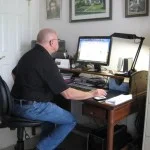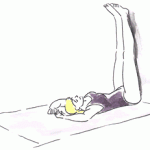Posture and The Gift of Pain
/This week I read an article about a young woman who does not experience pain. The article contains messages of human generosity and connection woven through the story of a genetic anomaly. It got me thinking about pain as a gift, as something to be thankful for in this season of giving thanks. Pain can signal danger and the need for protection—we can’t ignore that kind of pain. But I’m thinking more about the mundane, ignorable pain of getting up from the computer after sitting there too long, or of having to roll too gingerly out of bed in the morning.
I doubt there is a reader of these words who has not sat overly long at a computer thinking, “just one more click and I’ll get up”, “just one more paragraph and I’ll be finished”, “just one more site and I’ll have the information”. It’s an information age, not a proprioceptive age, and trance-inducing technologies and media are changing not just our brains, but also our bodies. The trance induces us to ignore our bodies’ natural craving for activity, or dull it with food or drink. If you’re young--say, under 35--you might be able to sustain the habit of immobility a while longer, but if you’re approaching the upper decades, the habit of not moving makes a deep impression. Moving becomes painful!
Gil Hedley’s presentation on YouTube illustrates how this occurs. The clip is graphic, showing images of dissection, but if you watch it, you’ll get my point. (Search for The Fuzz Speech.) When we’re immobile, our connective tissue produces extra fibrous material--picture cotton candy. The sticky stuff adheres to structures within our bodies, trapping and irritating nerves. The less we move, the greater the effect, until we are cemented into our habitual postural positions. We call this "aging", and we never think it will happen to us!
Having entered my 8th decade, I’m susceptible to a certain amount of morning stiffness. I need to do my simple morning yoga routine. This involves lying on the floor with my legs up the wall in an L shape and stretching my arms overhead. It hurts for a bit, and then it feels wonderfully emancipating. After that I do three or four simple yoga poses, ones you would be taught in a beginning yoga class. But lately I’ve been beset with details, some of which are new and taxing, and so I’ve overridden my essential 20 minutes of morning body time in order to engage with my to-do list.
Here’s the message I want to share: mundane pain is a messenger and a gift. People like Ashlyn Blocker don't have this gift. It takes a village to protect her from being hurt by her natural exuberance. While pain tells the rest of us to keep our hand from a flame, we too readily ignore the subtler pain of our bodies’ need for movement. This Thanksgiving Day I’m waking up to the gift of my morning stiffness with appreciation and the intention to listen to its message. I hope you'll be doing the same.



